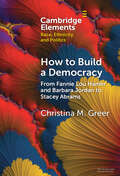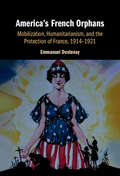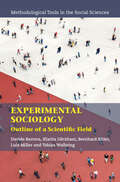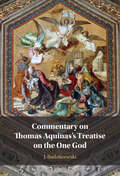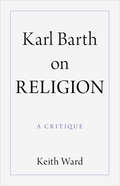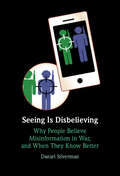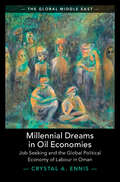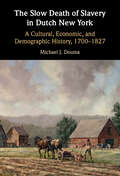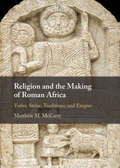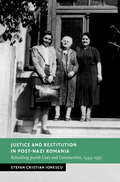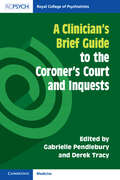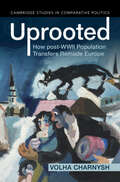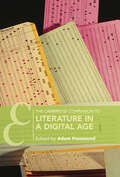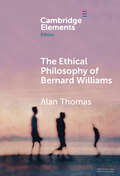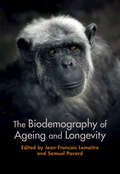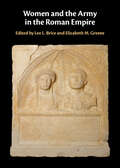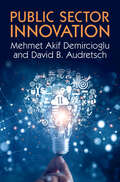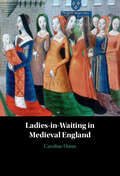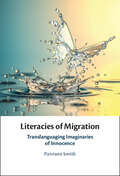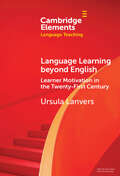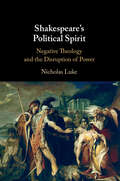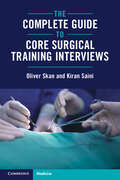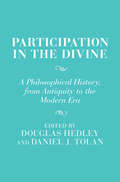- Table View
- List View
How to Build a Democracy: From Fannie Lou Hamer and Barbara Jordan to Stacey Abrams (Elements in Race, Ethnicity, and Politics)
by Christina M. GreerFrom the toils of Fannie Lou Hamer and Barbara Jordan emerges a twenty-first-century leader, Stacey Abrams. This Element explores the strategic organizing acumen of Fannie Lou Hamer in Mississippi and across the South, and the rise of Barbara Jordan, the second Black woman elected to the House of Representatives and the first Black woman from the US South to head to Congress. The leadership skills and collective political efforts of these two women paved the way for the emergence of Stacey Abrams, candidate for governor of Georgia in 2018 and 2022, and organizer of an electoral movement that helped deliver the 2020 presidential victory and US Senate majority to the Democratic Party. This Element adds to the existing literature by framing Black women as integral to the expansion of new voters into the Democratic Party, American democracy, and to the political development of Black people in the US South.
America's French Orphans: Mobilization, Humanitarianism, and the Protection of France, 1914–1921
by Emmanuel DestenayDuring and after World War I, two humanitarian organizations galvanized the support of American men, women, and children to provide for France's children. Between 1914 and 1921, the Committee Franco-American for the Protection of the Children of the Frontier (CFAPCF) and the Fatherless Children of France Society (FCFS) capitalized on the generosity of Americans who believed that supporting a French child in need was seen as a moral and patriotic duty. Through a network of twenty-eight colonies – private homes and estates loaned for this specific purpose – the CFAPCF rescued, sheltered, and cared for children from invaded and occupied war zones, while the FCFS asked Americans to sponsor France's children of the war dead. Combining cultural, political, and diplomatic history, Emmanuel Destenay charts the rapid growth of these organizations and brings to light the unparalleled contribution made by Americans in support of France's children in time of war.
Experimental Sociology: Outline of a Scientific Field (Methodological Tools in the Social Sciences)
by Davide Barrera Klarita Gërxhani Bernhard Kittel Luis Miller Tobias WolbringExperiments have gained prominence in sociology in recent years. Increased interest in testing causal theories through experimental designs has ignited a debate about which experimental designs can facilitate scientific progress in sociology. This book discusses the implications of research interests for the design of experiments, identifies points of commonality and disagreement among the different perspectives within sociology, and elaborates on the rationales of each. It helps experimental sociologists find appropriate designs for answering specific research questions while alerting them to the challenges. Offering more than just a guide, this book explores both the historical roots of experimental sociology and the cutting-edge techniques of rigorous sociology. It concludes with a tantalizing peek into the future and provides a roadmap to the exciting prospects and uncharted territories of experimental sociology.
Commentary on Thomas Aquinas's Treatise on the One God
by J. BudziszewskiThomas Aquinas's classic Treatise on the One God is one of the greatest works ever written in the history of philosophy and theology. During the first half of the twentieth century, philosophy of religion was widely viewed as dead, not even a domain of serious questions but only of 'pseudo-questions.' Surprisingly, not only did the supposed corpse rise from the dead, but religion once again became one of the most active fields of philosophical investigation. The time could not be more fitting for a reinvestigation of Treatise on the One God, which opens the massive Summa theologiae. In this unparalleled exploration of the Treatise's penetrating arguments J. Budziszewski explores and illuminates the text with a luminous line-by-line commentary. Supplemented with thematic discussions, this book discusses not only the Treatise itself, but also its immediate relevance to contemporary thought and issues of the modern world. This work fittingly closes the author's series of commentaries on the Summa Theologiae.
Karl Barth on Religion: A Critique
by Keith WardKarl Barth is one of the most influential theologians of the past century, especially within conservative branches of Christianity. Liberals, by contrast, find many of his ideas to be problematic. In this study, Keith Ward offers a detailed critique of Barth's views on religion and revelation as articulated in Church Dogmatics. Against Barth's definition of religions as self-centred, wilful, and arbitrary human constructions, Ward offers a defence of world religions as a God-inspired search for and insight into spiritual truth. Questioning Barth's rejection of natural theology and metaphysics, he provides a defence of the necessity of a philosophical foundation for Christian faith. Ward also dismisses Barth's biased summaries of German liberal thought, upholding a theological liberalism that incorporates Enlightenment ideas of critical inquiry and universal human rights that also retains beliefs that are central to Christianity. Ward defends the universality of divine grace against Barth's apparent denial of it to non-Christian religions.
Seeing Is Disbelieving: Why People Believe Misinformation in War, and When They Know Better
by Daniel SilvermanFactual misinformation is spread in conflict zones around the world, often with dire consequences. But when is this misinformation actually believed, and when is it not? Seeing is Disbelieving examines the appeal and limits of dangerous misinformation in war, and is the go-to text for understanding false beliefs and their impact in modern armed conflict. Daniel Silverman extends the burgeoning study of factual misinformation, conspiracy theories, and fake news in social and political life into a crucial new domain, while providing a powerful new argument about the limits of misinformation in high-stakes situations. Rich evidence from the US drone campaign in Pakistan, the counterinsurgency against ISIL in Iraq, and the Syrian civil war provide the backdrop for practical lessons in promoting peace, fighting wars, managing conflict, and countering misinformation more effectively.
Millennial Dreams in Oil Economies: Job Seeking and the Global Political Economy of Labour in Oman (The Global Middle East)
by Crystal A. EnnisThis book shifts the analysis of economic development in Oman from the traditional focus on oil to the perspective of labour. Focusing on the experiences of workers, jobseekers, and the governance of labour markets, Crystal A. Ennis offers a fresh perspective on regional development and rentier neoliberalism in the Gulf. Highlighting Oman's position within global capitalism, Ennis makes a compelling case for de-exceptionalising the Gulf, arguing that the region's labour markets are global and subject to similar pressures as other global economies. Moving beyond oil also allows Ennis to focus on the social conditions of Oman, where over sixty four percent of the population are under the age of thirty. Ennis offers a rich analysis of historical lineages of labour governance, class formation; and, following protests after 2011 as youth unemployment soared in the region, how authoritarian states react to public pressure and social unrest around perceived economic decline.
The Slow Death of Slavery in Dutch New York: A Cultural, Economic, and Demographic History, 1700–1827
by Michael J. DoumaOriginal and deeply researched, this book provides a new interpretation of Dutch American slavery which challenges many of the traditional assumptions about slavery in New York. With an emphasis on demography and economics, Michael J. Douma shows that slavery in eighteenth-century New York was mostly rural, heavily Dutch, and generally profitable through the cultivation of wheat. Slavery in Dutch New York ultimately died a political death in the nineteenth century, while resistance from enslaved persons, and a gradual turn against slavery in society and in the courts, encouraged its destruction. This important study will reshape the historiography of slavery in the American North.
Religion and the Making of Roman Africa: Votive Stelae, Traditions, and Empire
by Matthew M. McCartyThis book fundamentally rewrites the cultural and religious history of North Africa under the Roman Empire, focalized through rituals related to child sacrifice and the carved-stone monuments associated with such offerings. Earlier colonial archaeologies have stressed the failure of the empire to 'Romanize' Indigenous and Punic settler populations, mobilizing inscriptions and sculpture to mirror and explain modern European colonial failures as the result of ethnic African permanence. Instead, this book uses postcolonial theory, pragmatic semiotics, material epistemologies, and relational ontologies to develop a new account of how Roman hegemony transformed and was reproduced through signifying practices in even a seemingly traditional, 'un-Roman' rite such as child sacrifice. In doing so, the book offers a model for understanding the Roman Empire, the peoples who lived across its provinces, and their material worlds.
Justice and Restitution in Post-Nazi Romania: Rebuilding Jewish Lives and Communities, 1944–1950 (New Studies in European History)
by Stefan Cristian IonescuOn 23rd August 1944, following the collapse of the pro-Nazi dictatorship of Ion Antonescu, Romania changed sides and abandoned the Axis to join the Allies. Justice and Restitution in Post-Nazi Romania explores the hopes, struggles and disappointments of Jewish communities in Romania seeking to rebuild their lives after the Holocaust. Focusing on the efforts of survivors to recuperate rights and property, Stefan Cristian Ionescu demonstrates how the early transitional government enabled short term restitution. However, from 1948, the consolidated communist regime implemented nationalizations which dispossessed many citizens. Jewish communities were disproportionality affected, and real estate and many businesses were lost once again. Drawing on archival sources from government documentation to diaries and newspaper reports, this study explores both the early success and later reversal of restitution policies. In doing so, it sheds light on the postwar treatment of Romanian Jewish survivors, and the reasons so many survivors emigrated from Romania.
A Clinician's Brief Guide to the Coroner's Court and Inquests (A Clinician's Brief Guide)
by Gabrielle Pendlebury Derek TracyThe sudden and unexpected death of a patient can be emotionally complex and overwhelming for clinicians. This book will equip medical and other healthcare professionals with the necessary information and skills to fulfil their requirements in the coroner's court confidently and competently and understand their organisation's responsibilities. Practical and straightforward, this book aims to make the unfamiliar territory of the coroner's court transparent, enabling clinicians to negotiate all eventualities. It will provide clinicians with the confidence to turn what can feel like an adversarial situation into an opportunity to engage with an important part of the healthcare system, preventing future deaths and providing understanding to relatives. It also explores the underlying necessity of complying with requirements and suggests ways to cope with the emotional impact. With chapters covering expert witnesses, legal perspectives and managing outcomes, this book is essential for any healthcare professional called to an inquest.
Uprooted: How post-WWII Population Transfers Remade Europe (Cambridge Studies in Comparative Politics)
by Volha CharnyshEach year, millions of people are uprooted from their homes by wars, repression, natural disasters, and climate change. In Uprooted, Volha Charnysh presents a fresh perspective on the developmental consequences of mass displacement, arguing that accommodating the displaced population can strengthen receiving states and benefit local economies. Drawing on extensive research on post-WWII Poland and West Germany, Charnysh shows that the rupture of social ties and increased cultural diversity in affected communities not only decreased social cohesion, but also shored up the demand for state-provided resources, which facilitated the accumulation of state capacity. Over time, areas that received a larger and more diverse influx of migrants achieved higher levels of entrepreneurship, education, and income. With its rich insights and compelling evidence, Uprooted challenges common assumptions about the costs of forced displacement and cultural diversity and proposes a novel mechanism linking wars to state-building.
The Cambridge Companion to Literature in a Digital Age (Cambridge Companions to Literature)
by Adam HammondLiterature has experienced two great medium shifts, each with profound implications for its forms, genres, and cultures: that from orality to writing, and that from writing to printing. Today we are experiencing a third shift, from printed to digital forms. As with the previous shifts, this transformation is reconfiguring literature and literary culture. The Cambridge Companion to Literature in the Digital Age is organized around the question of what is at stake for literary studies in this latest transition. Rather than dividing its chapters by methodology or approach, this volume proceeds by exploring the major categories of literary investigation that are coming under pressure in the digital age: concepts such as the canon, periodization, authorship, and narrative. With chapters written by leading experts in all facets of literary studies, this book shows why all those who read, study, and teach literature today ought to attend to the digital.
The Ethical Philosophy of Bernard Williams (Elements in Ethics)
by Alan ThomasThis Element surveys the main claims of Bernard Williams's ethical philosophy. Topics include ethical scepticism, virtue, reasons for action, the critique of the Morality System, moral realism and the nature of theorising in ethics.
The Biodemography of Ageing and Longevity
by Jean-François Lemaître Samuel PavardWhy and how we age are probably two of science's oldest questions, echoing personal beliefs and concerns about our own finitude. From the earliest musings of ancient philosophers to recent pharmacological trials aimed at slowing ageing and prolonging longevity, these questions have fascinated scientists across time and fields of research. Taking advantage of the natural diversity of ageing trajectories, within and across species, this interdisciplinary volume provides a comprehensive view of the recent advances in ageing and longevity through a biodemographic approach. It includes the key facts, theories, ongoing fields of investigation, big questions, and new avenues for research in ageing and longevity, as well as considerations on how extending longevity integrates into the social and environmental challenges that our society faces. This is a useful resource for students and researchers curious to unravel the mysteries of longevity and ageing, from their origins to their consequences, across species, space and time.
Women and the Army in the Roman Empire
by Lee L. Brice Elizabeth M. GreeneThe presence of women in Roman military contexts has been established beyond doubt by scholars in recent decades. Nevertheless, very little sustained attention has been paid to who these women were, how they fit into the fabric of settlements, and what their contributions were to these communities. This volume offers new insights into the associations, activities, and social roles of women in the context of the Roman army, emphasizing the tangible evidence for the lived realities of women and families at different social levels. The various chapters adopt dynamic perspectives and shed new light on archaeological and historical evidence to provide novel conclusions about women's lives in antiquity. Histories of the Roman army can no longer ignore the women who lived and worked in its midst and histories of Roman women must acknowledge their important military role.
Public Sector Innovation
by Mehmet Akif Demircioglu David B. AudretschGovernments around the world are under pressure to do more with less. Dispelling the conventional wisdom that government is the enemy of innovation, this book argues that the promise of innovation addressing the most compelling societal problems will only come to fruition if governments become full partners and participants in innovation. The authors provide a systematic overview, analysis, framework, research agenda, and strategic directions for the study of public sector innovation, examining drivers, sources, barriers, typologies, and outcomes of innovation along with ethics. They suggest that innovation in government requires a new approach to public sector strategy, organization, human resources, and culture. Featuring large data analyses and poignant case studies drawn from best practices across the globe, Demircioglu and Audretsch identify what works and what doesn't in transforming governments from the periphery to the very heart of the most profound innovations driving societal change and development.
Ladies-in-Waiting in Medieval England
by Caroline DunnLadies-in-Waiting in Medieval England examines female attendants who served queens and aristocratic women during the late medieval period. Using a unique set of primary source based statistics, Caroline Dunn reveals that the lady-in-waiting was far more than a pretty girl sewing in the queen's chamber while seeking to catch the eye of an eligible bachelor. Ladies-in-waiting witnessed major historical events of the era and were sophisticated players who earned significant rewards. They had both family and personal interests to advance – through employment they linked kin and court, and through marriage they built bridges between families. Whether royal or aristocratic, ladies-in-waiting worked within gendered spaces, building female-dominated social networks, while also operating within a masculine milieu that offered courtiers of both sexes access to power. Working from a range of sources wider than the subjective anecdote, Dunn presents the first scholarly treatment of medieval English ladies-in-waiting.
Literacies of Migration: Translanguaging Imaginaries of Innocence
by Patriann SmithDrawing on the lived experiences of high school-aged young Black immigrants, this book paints imaginaries of racialized translanguaging and transsemiotizing, leveraged transnationally by teenagers across the Caribbean and the United States. The Black Caribbean youth reflect a full range of literacy practices – six distinct holistic literacies – identified as a basis for flourishing. These literacies of migration encapsulate numerous examples of how the youth are racialized transgeographically, based on their translanguaging and transsemiotizing with Englishes, both institutionally and individually. In turn, the book advances a heuristic of semiolingual innocence containing eight elements, informed by the Black immigrant literacies of Caribbean youth. Through the eight elements presented – flourishing, purpose, comfort, expansion, paradox, originality, interdependence, and imagination – stakeholders and systems will be positioned to better understand and address the urgent needs of these youth. Ultimately, the heuristic supports a reinscribing of semiolingual innocence for Black Caribbean immigrant and transnational youth, as well as for all youth.
Language Learning beyond English: Learner Motivation in the Twenty-First Century (Elements in Language Teaching)
by Ursula LanversThis Element addresses the following three questions: can Global English unequivocally be framed as a 'killer' language for learning LOTEs (languages other than English)? If so, under what premises? (Section 1); what are the rationales and justifications for learning LOTE in the age of Global English? (Section 2); and what are the pedagogical and policy implications for learning LOTE in the age of Global English? What can we learn from current (best and less good) practice? (Section 3). Attempts to engage learners in learning a variety of languages – rather than just English – often fail to achieve desired results, both in Anglophone and non-Anglophone contexts. Can English be blamed? What can policymakers and educators do to address the crisis? This Element proposes a new matrix of rationales for language learning, advocating an interconnected, socially embedded justification for language learning. This title is also available as Open Access on Cambridge Core.
Shakespeare's Political Spirit: Negative Theology and the Disruption of Power
by Nicholas LukeThis exciting and challenging study reorients how we think about politics in Shakespeare and on the early modern stage. By reading Shakespeare's political drama as a negative mode of political experience and thought, Nicholas Luke allows us to appreciate the imaginative and disruptive elements of plays that might seem politically pessimistic. Drawing on a long religious and philosophical tradition of negativity and considering the writings of Hegel, Kierkegaard, Benjamin, Adorno, Derrida and Badiou, Luke pursues a phenomenology of political spirit that looks to the creative potential of experiences of failure, haunting, estrangement, impasse and dream. Through his notion of a negative political theology, he challenges traditional understandings of political theology and shows that Shakespeare's drama of negativity is more than a form of pessimistic critique, but rather a force of freedom and invention that animates the political imaginations of its audience.
The Complete Guide to Core Surgical Training Interviews
by Oliver Skan Kiran SainiWritten by the candidates who ranked first and second nationally in the 2023 Core Surgical Training (CST) application process, this book is a definitive guide to success in the CST interview. This book takes candidates through the CST interview process, covering all of the clinical, ethical, and leadership components that an applicant can expect to be tested on. Over 55 clinical and ethics-based cases and hundreds of interview questions are used as part of a spiral curriculum that covers common stations and helps to build a replicable approach to each station. It also covers important aspects of communication and presentation skills. The authors share their tips and tricks for scoring highly, helping candidates to maximise their chances and stand out in a highly competitive field. This book will be an invaluable resource for foundation-year doctors and international medical graduates preparing to apply for CST.
Vyavsay Ke Tatva class 9 - JCERT: व्यवसाय के तत्व ९वीं कक्षा - जेसीईआरटी
by Sanjay Gupta"व्यवसाय के तत्व" पुस्तक झारखंड एकेडेमिक काउंसिल के नवीनतम पाठ्यक्रम और परीक्षा पैटर्न के अनुसार तैयार की गई है। इसमें व्यवसाय के विभिन्न पहलुओं को सरल, सुलभ और रोचक भाषा में प्रस्तुत किया गया है। व्यवसाय को मानव जीवन में आर्थिक गतिविधियों के रूप में परिभाषित किया गया है, जिसका उद्देश्य वस्तुओं और सेवाओं का उत्पादन और वितरण करके लाभ कमाना है। यह क्रिया नियमित और सतत रूप से की जाती है। व्यवसाय की प्रकृति को इसके लक्षणों से समझा जा सकता है, जैसे कि साहस, जोखिम, लाभ, उपभोक्ता संतोष, और समाज की आवश्यकताओं की पूर्ति। व्यवसाय केवल आर्थिक क्रिया नहीं, बल्कि सामाजिक और मानवता से जुड़ी गतिविधि भी है। यह उद्योग, वाणिज्य, और व्यापार के साथ-साथ परिवहन, बैंकिंग और बीमा जैसी सेवाओं से भी जुड़ा है। व्यवसाय और पेशे में अंतर करते हुए, पुस्तक यह बताती है कि पेशा विशेष ज्ञान और कौशल पर आधारित होता है, जबकि व्यवसाय लाभ प्रेरित आर्थिक क्रियाओं का समूह है। रोजगार के अंतर्गत लोग दूसरों के लिए काम करते हैं और बदले में पारिश्रमिक प्राप्त करते हैं। व्यवसाय, पेशा और रोजगार के बीच अंतर समझाते हुए, पुस्तक मानवीय गतिविधियों के व्यावसायिक, सामाजिक और आर्थिक आयामों को उजागर करती है। इसके अतिरिक्त, पाठ्यक्रम में थोक और फुटकर व्यापार, व्यावसायिक लेन-देन, गोदाम और भंडारण, परिवहन और बीमा जैसे विषयों को विस्तार से समझाया गया है, जो छात्रों को वास्तविक व्यावसायिक दुनिया के लिए तैयार करते हैं।
Bharat Ki Rajvyavastha - 7th edition: भारत की राजव्यवस्था - 7वां संस्करण
by M. Laxmikanthभारत की राजव्यवस्था पुस्तक का सातवां संस्करण एम. लक्ष्मीकांत द्वारा लिखा गया है और सिविल सेवा परीक्षाओं की तैयारी के लिए एक अनिवार्य पुस्तक मानी जाती है। यह पुस्तक भारतीय संविधान, राजनीतिक ढांचे, और प्रशासनिक प्रणाली पर विस्तृत जानकारी प्रदान करती है। इसमें ऐतिहासिक पृष्ठभूमि से लेकर समकालीन संवैधानिक संशोधनों, सर्वोच्च न्यायालय के निर्णयों और हालिया संवैधानिक मुद्दों तक का समावेश है। पुस्तक में भारतीय राजव्यवस्था के विभिन्न पहलुओं को सरल और संगठित रूप में प्रस्तुत किया गया है, जैसे मूल अधिकार, मूल कर्तव्य, नीति निदेशक तत्व, केंद्र-राज्य संबंध, संघीय व्यवस्था, पंचायती राज, और चुनाव प्रक्रिया। इसके अलावा, पुस्तक में द्विसदनीय विधायिका, न्यायपालिका की भूमिका, और भारत की विविधतापूर्ण लोकतांत्रिक प्रणाली का भी विस्तार से वर्णन है। इस संस्करण में 12 नए अध्याय और 1 परिशिष्ट जोड़े गए हैं, जो इसे और समृद्ध और अद्यतन बनाते हैं। साथ ही, 2020-2023 के प्रारंभिक और मुख्य परीक्षा के प्रश्नों को भी शामिल किया गया है। पुस्तक के लेखक ने इसे अध्ययन के लिए उपयोगी बनाने के लिए तालिकाओं और सारिणियों का भी इस्तेमाल किया है। यह पुस्तक न केवल सिविल सेवा परीक्षाओं के लिए बल्कि राजनीति विज्ञान, समाजशास्त्र, और सार्वजनिक प्रशासन के छात्रों के लिए भी अत्यंत उपयोगी है। यह पुस्तक भारत के संवैधानिक विकास और उसके व्यावहारिक कार्यान्वयन को समझने में मदद करती है।
Participation in the Divine: A Philosophical History, From Antiquity to the Modern Era (Cambridge Studies in Religion and Platonism)
by Douglas Hedley Daniel J. TolanThe concept of participation in a transcendent domain of existence is central to the Platonic and the Judaeo-Christian traditions. It is how thinkers throughout history have justified existence itself, explaining temporal being vis-à-vis God. Yet in the wake of secularisation and the widespread phenomenon of disenchantment, this once ubiquitous and coveted notion has fallen into desuetude. The essays in this volume analyse and explore this key concept in the history of Western thought. They provide, for the first time, a rigorous and accessible account of participation, a pivotal concept in Western philosophy and theology, from antiquity to the modern era. Bringing together contributions by an international team of leading scholars of the Platonic tradition, the volume challenges a standard distinction between philosophy and theology. It also enables a comprehensive understanding of figures who do not fit neatly into the modern university's division of these subjects.
